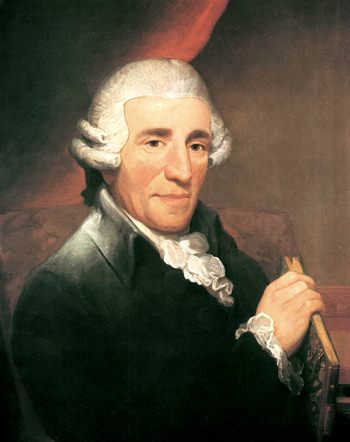So asked the teenage Juliet before coming out with another immortal line, “That which we call a rose by any other name would smell as sweet…” Anyway, the phrase sprang to mind the other day when I was looking through a list of classical works best-known by their nicknames. Maybe I should explain.

Sometimes composers gave their works sub-titles such as Tchaikovsky’s Pathétique Symphony and Beethoven’s Eroica and Pastoral symphonies but these don’t count as nicknames because a nickname is not given by the composer. Mozart’s Symphony No 41 was probably nicknamed Jupiter by the impresario Johann Salomon.
Beethoven’s Piano Sonata No 14 became known as The Moonlight Sonata from comments made after the composer’s death by the German music critic and poet Ludwig Rellstab. Subsequent publications of the work used this catchy nickname and it stuck. Incidentally, the word “nickname” can be traced back to 1303 and to the word ekename which derives from an Old English phrase meaning “to increase”. By the fifteenth century the word had evolved into nekename.
Schubert’s Piano Quintet in A major was dubbed The Trout because the fourth movement is a set of variations on his song of the same name. A surprising number of Haydn’s symphonies have acquired nicknames, probably because he wrote so many and a nickname makes a useful mnemonic. So for example, we have Haydn symphonies known as The Bear, The Hen, The Clock, The Military, The Philosopher, and so on. Some of the nicknames have little musical significance but one of them has an interesting story behind it, told by Haydn himself in his old age to his biographers Albert Christoph Dies and Georg August Griesinger.
Joseph Haydn (1732-1809): Symphony No. 45 in F sharp minor (“Farewell”). Stanislaw Moniuszko School of Music Symphony Orchestra in Bielsko Biala (Poland) cond. Andrzej Kucybala (Duration: 30:07; Video 1080p HD)
Perhaps you know the story already. At the time, Haydn was employed as Kapellmeister to the fabulously wealthy Prince Nikolaus Esterházy. The family’s main palace was Schloss Esterházy in Eisenstadt in Eastern Austria. The family also had a sumptuous summer palace in Esterhaza, about a day’s journey away to which the entire court – together with Haydn and the orchestra – would go every summer.
In 1772 the summer retreat was longer than expected and by October many wanted to get home to their families in Eisenstadt. The musicians asked Haydn to appeal to Prince Esterházy on their behalf and preferring diplomacy to confrontation, Haydn put his request in the form of a symphony which was subsequently performed for the Prince and the court. In the last movement, groups of musicians stop playing, snuff out the candles on their music stands and leave the stage. In the end there are just two violinists left. In the original performance these were Haydn himself and the orchestra’s leader Luigi Tomasini. Fortunately, Prince Esterházy took the hint and the following day the entire court returned to Eisenstadt.
Incidentally, it’s thought that this is the only eighteenth century symphony written in the key of F sharp minor. It’s probably the only classical symphony that has a second slow movement at the end. But this might have been necessary for Haydn’s trick to work and must have come as a surprise to the Prince who at first probably wondered what was going on.
Ludwig van Beethoven (1770-1827): Piano Trio in D Major Op.70, No.1 (“The Ghost”). Emanuel Ax (pno), Isaac Stern (vln), Yo-Yo Ma (vlc) (Duration: 23:12; Video: 480p)
This is one of Beethoven’s most brilliant works from his so-called middle-period, a time when he wrote some of his most famous works, including the fifth and sixth symphonies.
This trio was published in 1808 and represents the composer’s venturing into new musical territories. The nickname “Ghost” comes from the oddly scored and eerie-sounding slow movement which even two hundred years later seems remarkably ominous at times. Interestingly at about the same time, Beethoven had begun sketching ideas for an opera based on Shakespeare’s supernaturally-charged play Macbeth but the librettist Heinrich Joachim von Collin eventually gave up work on the text because he found the whole story too depressing. Or perhaps he was overtly superstitious.
The two outer movements are in complete contrast to the ghostly goings-on, with lively rhythms, expansive melodies and an exuberant drive that never runs out of energy. The musicians are about as good as you’ll get and include a comparatively young Yo-Yo Ma performing with the incomparable Isaac Stern, thirty-five years his senior. Watching these splendid musicians is an education in itself and you can see the close eye they keep on each other. It’s well worth enduring the rather poor video quality for such a superb performance.
 |
 |
 |





